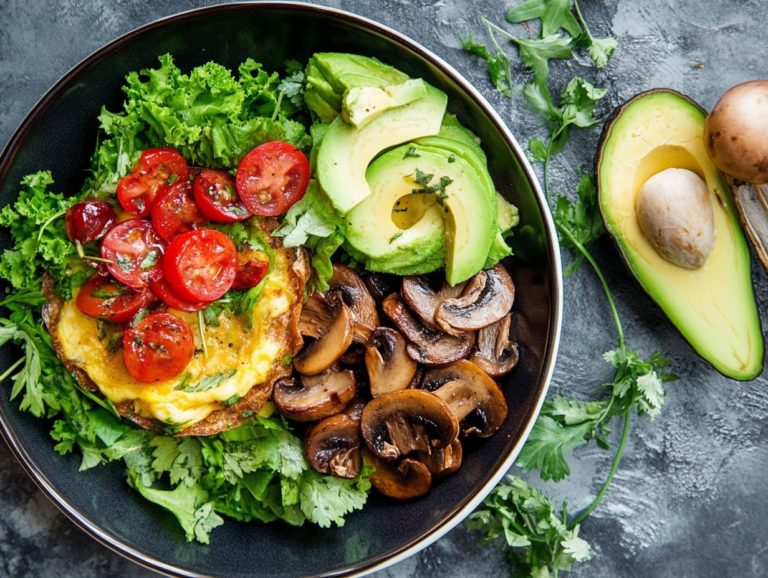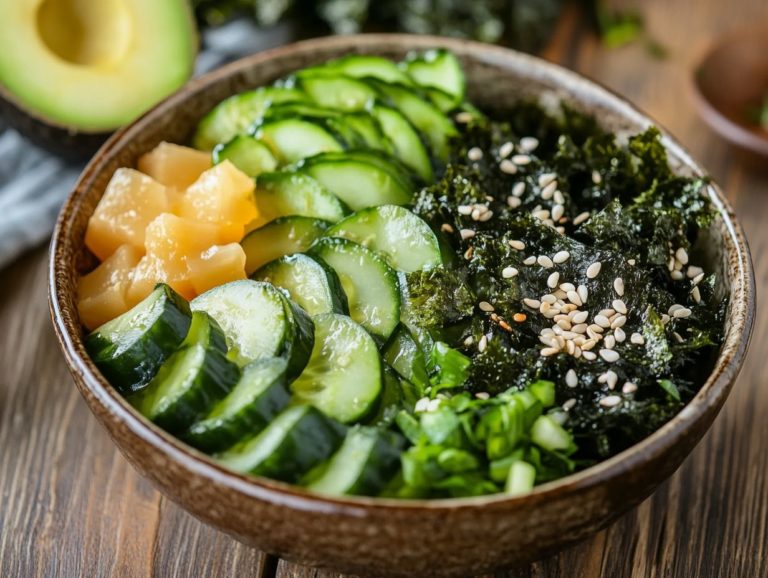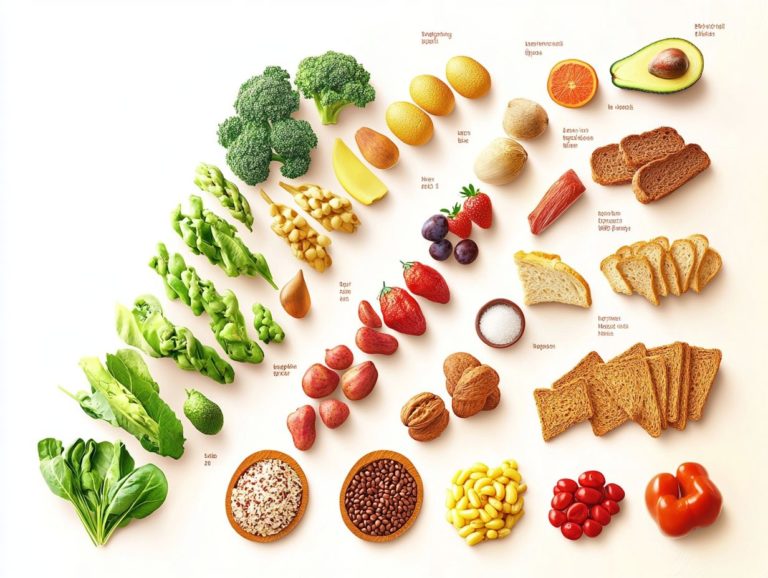Exploring Coconut Products for Keto
The keto diet has surged in popularity, known for helping with weight loss and improving health. But what about coconut products in this low-carb lifestyle?
This article delves into a range of coconut offerings coconut oil, flour, milk, flakes, chips, and water and evaluates their compatibility with a keto diet. It highlights their nutritional benefits, shares mouthwatering keto recipes to seamlessly integrate them into your meals, and addresses any potential risks you should be aware of.
Dive into the exciting world of coconut products, specifically designed for keto lovers like you!
Contents
- Key Takeaways:
- What is the Keto Diet?
- What are Coconut Products?
- Exploring Coconut-Based Products
- What is Coconut Water?
- Are Coconut Products Suitable for Keto?
- What are the Nutritional Benefits of Coconut Products?
- How do Coconut Products Fit into the Keto Diet?
- How to Incorporate Coconut Products into Your Keto Diet?
- Delicious Coconut Recipes for a Healthy Lifestyle
- Are There Any Risks or Side Effects of Using Coconut Products on Keto?
- Common Questions About Coconut Products on Keto
- What are the top coconut products that are suitable for a keto diet?
- Can coconut products help with weight loss on a keto diet?
- Are all coconut products keto-friendly?
- How can I incorporate coconut products into my keto diet?
- Are coconut products a good source of fat on a keto diet?
- Can I use coconut products as a substitute for dairy on a keto diet?
Key Takeaways:
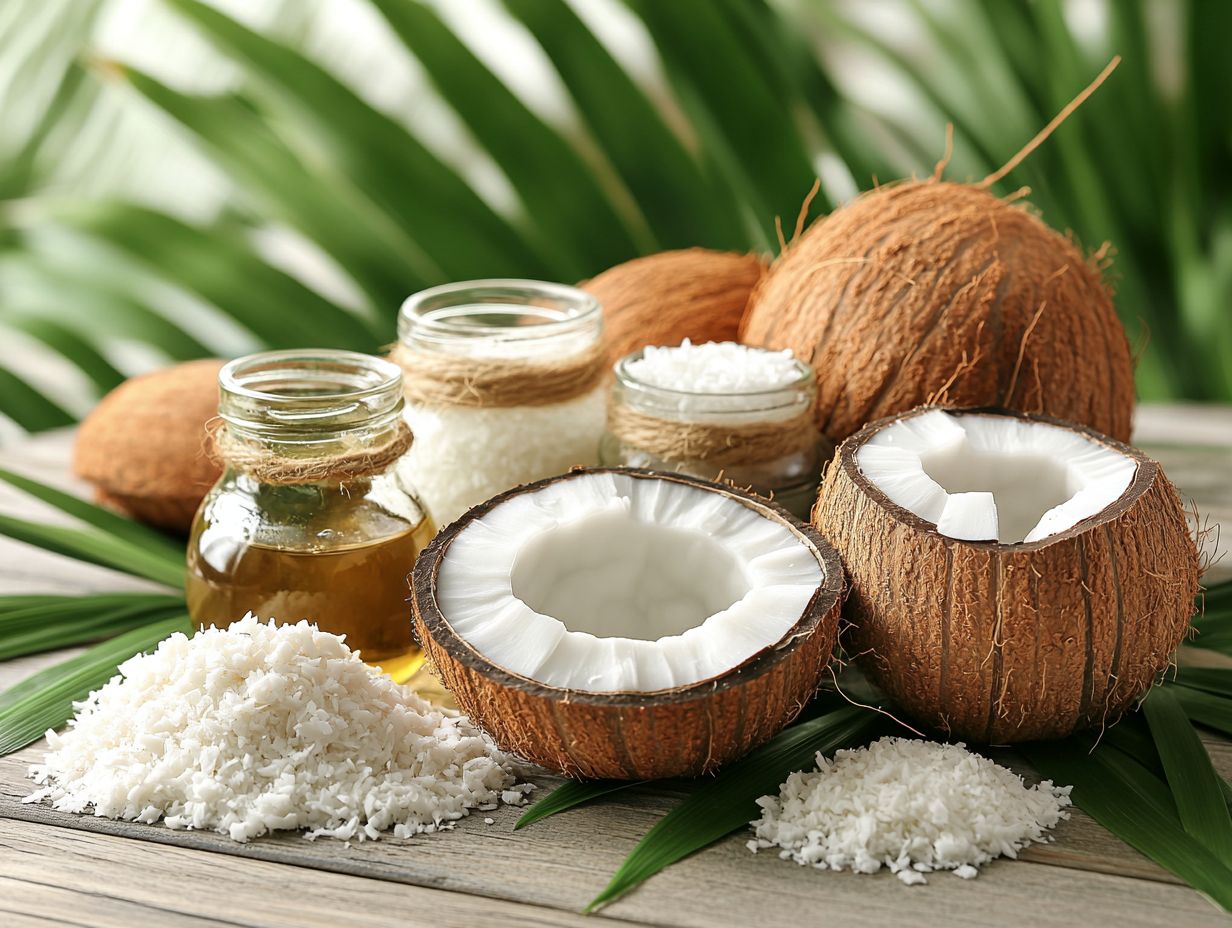
- Coconut products, such as oil, flour, milk, and water, are suitable for a keto diet due to their low carb content and high healthy fat content.
- Incorporating coconut products into your keto diet can provide nutritional benefits such as increasing your intake of healthy fats, fiber, and protein.
- While coconut products can be beneficial on a keto diet, it is important to consume them in moderation to avoid potential risks such as weight gain and digestive issues.
What is the Keto Diet?
The Keto Diet, or Ketogenic Diet as it s formally known, is a high-fat, low-carb eating strategy designed to transition your body into a state of ketosis. In this metabolic state, your body shifts its energy source from carbohydrates to fat.
This approach promotes the intake of healthy fats, moderate protein, and minimal carbohydrates, unlocking a range of health benefits like weight loss and increased energy levels.
By dramatically cutting back on carbs and replacing them with fat, your body starts breaking down fats into ketones. These little powerhouses serve as an alternative energy source, boosting both your mental clarity and physical performance.
What are Coconut Products?
Coconut products include a delightful array of edible items from the coconut palm. This species is scientifically known as Cocos nucifera.
You ll find an impressive selection that includes coconut oil, coconut milk, coconut flour, coconut flakes, and coconut chips, each boasting its own unique flavors and health benefits.
Rich in saturated fat, these coconut-based foods are celebrated for their potential health perks, such as anti-inflammatory properties and heart health support. They are also great sources of medium-chain triglycerides (MCTs), which can enhance your energy levels and boost metabolism, making them a favorite in various diets, particularly the keto diet.
What is Coconut Oil?
Coconut oil is an exquisite edible oil extracted from the flesh of mature coconuts, celebrated for its high saturated fat content and distinctive health benefits, particularly due to its medium-chain triglycerides (MCTs). This remarkable oil has risen to prominence in the culinary world, offering a rich flavor profile and an array of cooking advantages, whether you’re frying or baking.
You may find coconut oil particularly appealing for its potential health benefits, which include enhancing heart health, promoting weight loss, and providing an invigorating energy boost. It’s no wonder it’s become a kitchen staple, especially among those embracing a keto lifestyle.
The extraction process for coconut oil typically involves either cold-pressing or refining, depending on your desired outcome. Unrefined coconut oil retains a wealth of nutrients and flavor, making it a top choice for those who favor natural options. On the other hand, refined coconut oil boasts a higher smoke point, making it ideal for high-temperature cooking.
Beyond its culinary delights, coconut oil is also widely employed in skincare, renowned for its moisturizing properties and ability to enhance skin health. Packed with antioxidants, it fights off free radicals and delivers a plethora of coconut health benefits, making it a remarkable addition to both your dietary and beauty routines.
Exploring Coconut-Based Products
What is Coconut Flour?
Coconut flour is a gluten-free marvel crafted from dried and ground coconut meat. It offers a nutritious alternative to traditional flours. Its impressive fiber and protein content makes it an exceptional choice for low-carb baking, especially if you re following a keto lifestyle.
With its distinct texture and subtly sweet flavor, you can do a lot with coconut flour. It can elevate a variety of keto recipes, from fluffy pancakes to hearty bread, delivering a healthy source of carbohydrates that are low in net carbs. Just remember that its highly absorbent nature means you may need to add more liquids to your recipe when incorporating coconut flour.
This versatile flour boasts a nutritional profile rich in healthy fats and essential vitamins, making it not only a favorite among keto enthusiasts but also an excellent addition for anyone looking to enhance their overall diet. You can seamlessly blend it into smoothies for added thickness, use it as a breading for meats, or even stir it into soups for a delightful texture.
When venturing into baking, it s wise to start with recipes specifically designed for coconut flour to prevent any risk of excessive dryness. Many seasoned bakers recommend combining coconut flour with other low-carb options, such as almond flour, chia seeds, or flaxseeds, to achieve a better rise and texture in cakes and muffins.
For an extra burst of flavor, add vanilla extract or a sprinkle of cinnamon to complement the natural sweetness of this unique ingredient.
What is Coconut Milk?
Coconut milk is a creamy delight extracted from the grated meat of mature coconuts. It’s a favorite in various cuisines thanks to its rich flavor and impressive health benefits. This dairy-free alternative packs a punch with its healthy fats, especially medium-chain triglycerides (MCTs), known for providing rapid energy, making it a top choice for anyone following vegan or low-carb diets, including the keto lifestyle.
Unsweetened coconut milk is incredibly versatile; whether you re whipping up a smoothie or a savory curry, it provides a rich source of energy while keeping net carbs low. This makes it a staple for many health-focused diets. For a nutritious breakfast, consider making low-carb granola using unsweetened coconut flakes, almonds, and other keto-friendly ingredients.
Beyond its culinary charm, coconut milk offers a host of health benefits, such as promoting heart health and aiding digestion. When selecting products, it’s essential to distinguish between unsweetened and sweetened varieties. Unsweetened options are perfect if you want to steer clear of added sugars while maximizing your nutritional intake. Remember, quality matters opting for organic products without preservatives often means higher nutrient levels.
Incorporating coconut milk into your balanced diet not only elevates the flavors of your meals but also aligns beautifully with your nutritional goals, particularly if you re pursuing low-carb or other health-conscious eating plans. Don t miss out on enjoying coconut milk as part of your breakfast!
What is Coconut Water?
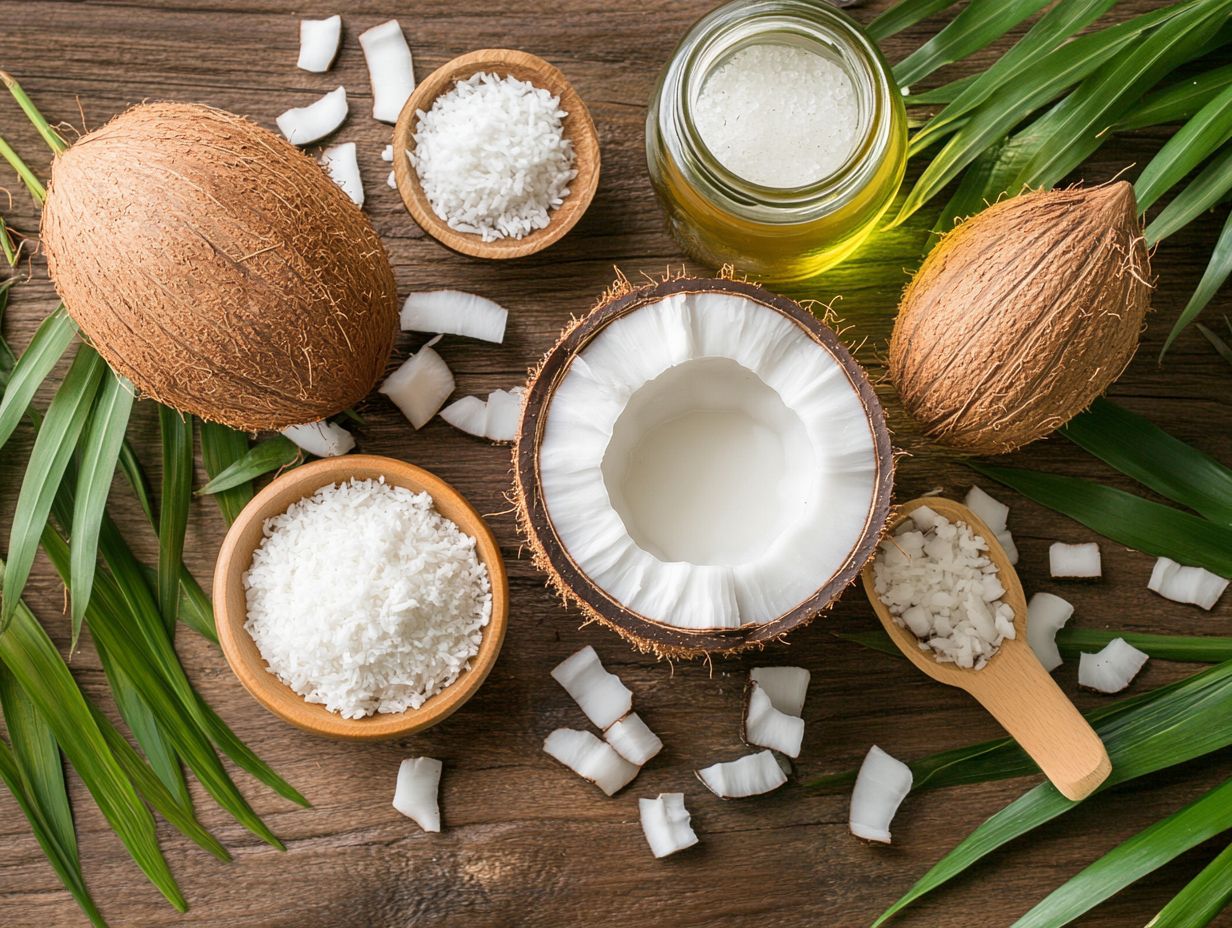
Coconut water is the delightful clear liquid found inside young, green coconuts. It s no wonder it s cherished for its refreshing taste and hydration properties! This natural beverage is low in calories and brimming with essential electrolytes. This makes it an excellent choice for rehydration after physical activities.
Packed with potassium and other vital nutrients, coconut water stands out as a healthier alternative to sugary sports drinks. It offers a pure source of hydration that supports your overall health.
Its unique flavor and natural sweetness make it a popular ingredient in smoothies and tropical beverages. Imagine blending it into fruit salads, incorporating it into cake batters, or creatively using it in cocktails and mocktails! Not only does it provide hydration, but it also imparts a subtle nutty flavor.
For health enthusiasts, its low glycemic index is a noteworthy benefit, especially for those monitoring their blood sugar levels.
By regularly incorporating coconut water into your diet, you re not just replenishing lost fluids; you re also significantly contributing to your daily electrolyte needs. It’s an enticing choice for anyone looking to naturally boost their wellness and enhance their hydration game!
Are Coconut Products Suitable for Keto?
Coconut products have captured the spotlight in the keto community, and for good reason. They are ideal for anyone embracing a low-carb, high-fat dietary lifestyle.
Think of coconut oil, coconut milk, and coconut flour; these powerful ingredients are full of healthy fats and essential nutrients that align seamlessly with ketogenic principles. Not only do they deliver crucial medium-chain triglycerides (MCTs) that boost your energy levels, but they also help you maintain a well-balanced intake of healthy fats while keeping your net carbs delightfully low.
By incorporating coconut products into your keto diet, you can enhance your weight loss efforts, supercharge your metabolism, and enjoy a plethora of health benefits along the way! Are you ready to elevate your keto journey with these amazing coconut products?
What are the Nutritional Benefits of Coconut Products?
Coconut products offer an array of nutritional benefits that make them a valuable addition to any diet, especially a keto diet. Rich in medium-chain triglycerides (MCTs), they help boost metabolism and provide a quick source of energy.
The healthy fats found in coconut products support heart health and improve overall wellness. These products are excellent sources of fiber and protein, making them ideal for low-carb diets.
From enhancing the flavors of your dishes to boosting your nutritional intake, integrating coconut products like coconut oil, coconut milk, coconut flour, coconut flakes, and coconut chips can greatly improve your keto lifestyle.
The nutritional benefits of coconut products are extensive, making them a valuable addition to your healthy diet, especially if you re embracing a keto lifestyle. Coconut nutrition also includes essential nutrients like fiber and protein, which are crucial for a balanced diet.
Coconut flour, with its impressive fiber content, contributes to digestive health while helping to regulate blood sugar levels. These attributes position coconut products, including coconut flakes and desiccated coconut, as excellent choices for maintaining a balanced diet and promoting your overall well-being.
These versatile options, including coconut oil, coconut milk, and shredded coconut, offer an array of nutritional components that cater to various dietary needs. For instance, coconut oil provides MCTs that fuel your body efficiently and contains lauric acid, which supports immune function.
Coconut milk serves as a creamy alternative that is a fantastic source of healthy fats, enhancing the absorption of nutrients from other foods you enjoy alongside it. Including unsweetened forms of these products ensures you avoid unnecessary sugars and stay aligned with your keto principles.
Incorporate various coconut products into your meals to enjoy their amazing benefits! You can experience the combined benefits of fiber, healthy fats, and essential nutrients, ultimately fostering improved health outcomes and enriching your overall dietary experience. Adding ingredients like almonds, flaxseeds, and chia seeds to your coconut recipes can further boost the nutritional value.
How do Coconut Products Fit into the Keto Diet?
Coconut products fit seamlessly into your keto diet, thanks to their low-carb, high-fat profile that makes them perfect for maintaining ketosis. With choices like coconut oil and coconut milk at your disposal, you can enhance your meals with healthy fats that are crucial for energy production and overall well-being.
Coconut flour also shines as a popular low-carb alternative for baking, enabling you to whip up keto-friendly recipes without compromising on flavor. Using coconut flakes in granola recipes provides a delightful crunch and nutritional boost.
By incorporating these coconut products into your daily meals, adhering to the principles of the ketogenic diet becomes effortless, all while indulging in the rich flavors and health benefits they provide.
For example, toss some coconut oil into your stir-fries or blend it into smoothies for a delicious and nutritious boost. Coconut milk is fantastic for crafting creamy soups and curries, while coconut flour can elevate your pancakes or brownies, satisfying those sweet cravings without the carbs.
Additionally, incorporating coconut chips into your homemade energy balls can provide a delightful texture and keep you satiated. Snacks like coconut chips or homemade energy balls made with shredded coconut offer a delightful treat that aligns perfectly with your low-carb goals.
Exploring a variety of coconut-based recipes can elevate your ordinary meals into extraordinary culinary experiences, all while supporting a healthy keto lifestyle. Try a new recipe today and unlock the delicious potential of coconut products!
How to Incorporate Coconut Products into Your Keto Diet?
Incorporating coconut products into your keto diet elevates both flavor and nutrition, providing a delightful avenue to sustain a low-carb lifestyle. Whether you choose to cook with coconut oil, bake with coconut flour, or whip up smoothies featuring coconut milk, these versatile ingredients seamlessly blend into a variety of meals and snacks.
From breakfast delights to indulgent desserts, coconut products deliver a distinctive flavor profile and healthy fats that align beautifully with the principles of the ketogenic diet. This gives you the power to stay focused on your dietary goals. Incorporating coconut flakes and other coconut derivatives into your meals ensures you receive an array of nutritional benefits.
Recipes Using Coconut Oil
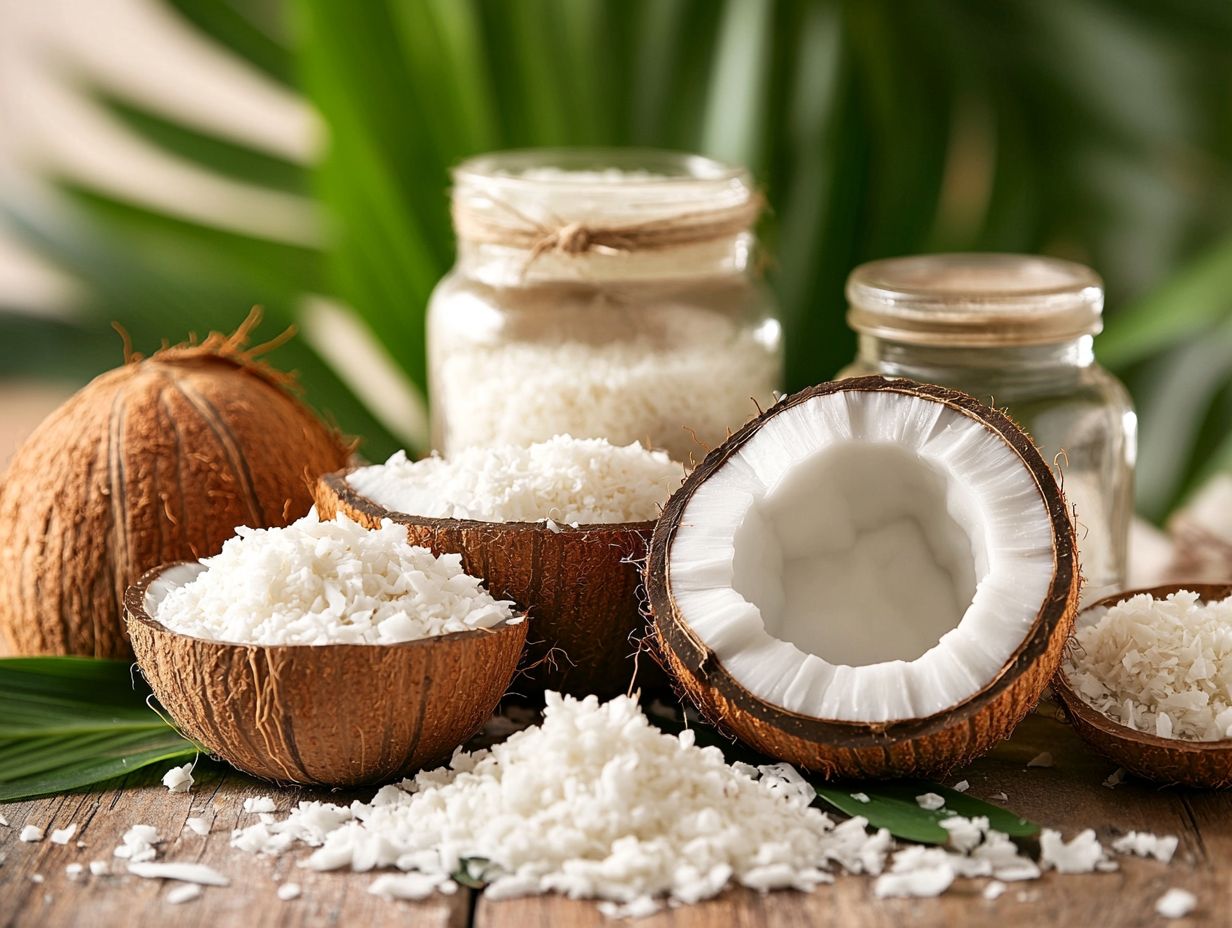
Coconut oil is an incredibly versatile ingredient that can elevate your keto recipes, enriching both flavor and health benefits. Whether you’re saut ing vegetables, baking decadent desserts, or crafting zesty salad dressings, the luscious flavor of coconut oil enhances a wide array of dishes while providing a beneficial source of healthy fats.
Enjoy delicious coconut oil brownies or savor stir-fried coconut shrimp; these delights not only satisfy your cravings but also align seamlessly with the low-carb principles of the ketogenic diet perfect for those committed to maintaining ketosis.
Its unique composition of medium-chain triglycerides (MCTs), a type of fat that provides quick energy, offers rapid energy and encourages fat burning, which is why it has become a go-to for keto enthusiasts.
Picture yourself whipping up fluffy pancakes with coconut oil, finished off with a drizzle of sugar-free syrup, or drizzling it over roasted cauliflower for a side dish that’s both delicious and nutritious.
Incorporating coconut oil into your bulletproof coffee can transform its creamy texture, resulting in a satisfying morning beverage that kickstarts your day. The cooking options are truly endless, making coconut oil an essential staple in any healthy kitchen dedicated to flavorful, low-carb cooking.
With these recipe tips, you can effortlessly integrate coconut oil into your daily diet.
Recipes Using Coconut Flour
Coconut flour unlocks a realm of delightful low-carb baking possibilities, especially tailored for anyone following a keto diet. With its high fiber content and distinctive texture, it serves as an exceptional alternative to traditional flours across a variety of recipes, whether you re crafting pancakes or muffins.
By leveraging the capabilities of coconut flour, you can whip up keto treats that satisfy your cravings, all while keeping net carbs in check. Think coconut flour chocolate chip cookies or airy coconut pancakes indulgence without the dietary detour.
Using combinations of coconut flour and almond meal amplifies the nutritional advantages and broadens your low-carb baking repertoire.
This versatile ingredient not only elevates the flavor profiles of your baked creations but also offers a plethora of nutritional advantages. When diving into low-carb baking, using coconut flour can substantially boost your dietary fiber intake, which is essential for maintaining digestive health.
For example, preparing coconut flour brownies or bread is remarkably simple and gratifying, requiring just a few straightforward steps.
If you re aiming to sustain your energy levels while relishing guilt-free delights, incorporating coconut flour into your recipes opens up a world of deliciously nutritious options that seamlessly complement a low-carb lifestyle.
Consider adding protein powder to enhance your meals and support your fitness goals.
Start experimenting with coconut products today and transform your keto meals!
Delicious Coconut Recipes for a Healthy Lifestyle
Discover the wonderful world of coconut recipes that not only tantalize your taste buds but also support your healthy lifestyle!
Recipes Using Coconut Milk
Coconut milk is a rich and creamy ingredient that elevates a variety of keto recipes. It’s a go-to for anyone embracing a low-carb lifestyle. Whether you’re whipping up curries or blending smoothies, coconut milk infuses your dishes with healthy fats and delightful flavor.
Think of recipes like coconut milk chicken curry or coconut milk chia pudding they nourish you and let you indulge in rich flavors while sticking to your dietary goals. These dishes are essential for your keto meal planning. Including unsweetened coconut milk helps you keep your calories in check while maximizing flavor.
Incorporating coconut milk into your cooking opens up a world of cooking creativity. You can explore an enticing medley of flavors and textures. For example, imagine transforming a simple vegetable soup into a luxurious meal, enriched with healthy fats that promote satisfaction and fullness.
Coconut milk truly shines in desserts! Try creamy coconut milk rice pudding, where its natural sweetness beautifully complements spices like cinnamon and vanilla. By embracing this versatile ingredient, you can reap the benefits of healthy fats while relishing the irresistibly creamy texture.
Recipes Using Coconut Water
Coconut water, celebrated for its refreshing taste and hydrating properties, offers a delightful opportunity to infuse creativity into your culinary repertoire. If you’re on the lookout for low-calorie options, consider elevating your smoothies with its naturally sweet flavor or using it as a base for tropical drinks!
Recipes like coconut water smoothies or coconut water fruit salads not only quench your thirst but also nourish your body. They are ideal for a healthy, low-calorie diet.
By incorporating this versatile ingredient into your meals, you enhance hydration and introduce a distinct tropical flair. Imagine blending a revitalizing coconut water and spinach smoothie that s rich in vitamins yet low in calories.
You could also drizzle a zesty coconut water vinaigrette over a fresh salad, transforming it into a lively dish. Using coconut water to cook grains like quinoa can elevate hydration levels while adding a subtle sweetness, resulting in a delicious and wholesome side. Adding a touch of vanilla can further enhance these recipes flavor and appeal.
With these enticing options at your fingertips, try these delightful recipes today! You can easily reap the benefits of coconut water while ensuring your meals are not only tasty but also nutritious.
Are There Any Risks or Side Effects of Using Coconut Products on Keto?
Coconut products undoubtedly offer a wealth of health benefits. However, it’s crucial to recognize the potential risks or side effects when integrating them into your keto diet. While they are high in healthy fats, it’s essential to balance these with other nutrient sources to avoid excessive calorie intake.
The high saturated fat content found in coconut oil and other coconut derivatives may raise eyebrows, especially for individuals with health concerns like heart disease. Large amounts of coconut products can lead to excessive calorie intake, which could derail your weight loss objectives tied to the ketogenic lifestyle.
Thus, keeping an eye on portion sizes and opting for unsweetened varieties can help mitigate these risks. Embracing moderation and practicing mindful consumption is essential as you savor these delightful offerings.
Share your own recipes or tips for using coconut products in the comments below!
Possible Risks of Consuming Too Much Coconut Oil on Keto
Consuming too much coconut oil on your ketogenic diet can come with some potential risks, especially given its high levels of saturated fat and calories. While coconut oil does have its benefits, going overboard can lead to elevated cholesterol levels and unintentional weight gain. This could sabotage your ketogenic goals!
It’s essential to monitor your coconut oil intake and balance it within your overall dietary plan to maintain your health and support your weight loss efforts. Incorporating other healthy fats and protein is beneficial as well.
Overindulgence in coconut oil could also put a strain on your heart health by increasing the risk of cardiovascular diseases. Striking the right balance with healthy fats is crucial. Consider a variety of fats, like avocados, nuts, and olive oil, along with almonds, chia seeds, and flaxseeds, to promote a heart-healthy eating strategy.
Being mindful of portion sizes while embracing the ketogenic lifestyle is key. This way, you ensure that the benefits of low-carb eating shine through, rather than being overshadowed by the potential pitfalls of excessive coconut oil consumption.
Recognizing these factors is essential for truly thriving on your keto journey. Incorporating a variety of keto-friendly ingredients such as coconut milk, desiccated coconut, and coconut flakes can diversify your diet while keeping it nutritious.
Possible Risks of Consuming Too Much Coconut Flour on Keto
Coconut flour can be a fantastic, nutritious alternative for your low-carb baking endeavors, but it’s important to exercise caution when using it. Consuming too much can lead to potential risks, mainly due to its high fiber content. If you re not accustomed to a high-fiber diet, excessive intake may cause digestive discomfort, including bloating and gas.
This underscores the importance of balanced fiber intake in your keto recipes. To navigate this, it s wise to gradually incorporate coconut flour into your keto recipes while paying close attention to your body s response.
Maintain a comfortable and balanced approach to your diet by pairing coconut flour with other fiber-rich ingredients like chia seeds and flaxseeds.
While coconut flour is often celebrated as a keto-friendly ingredient, remember that moderation is crucial. This will help you reap its benefits without experiencing any unpleasant side effects.
If you’re following a ketogenic diet, take extra care, as your body may be adjusting to a different balance of fats, proteins, and carbohydrates.
Start integrating coconut flour into your meals thoughtfully perhaps begin with small amounts in recipes like pancakes or muffins to give your digestive system the chance to adapt.
Adopting this strategy can help you avoid the discomfort that comes with sudden increases in dietary fiber. This way, you ensure a more satisfying and enjoyable culinary journey.
Consider recipes that combine coconut flour with other keto-friendly ingredients like coconut chips and granola for added texture and taste!
Possible Risks of Consuming Too Much Coconut Milk on Keto
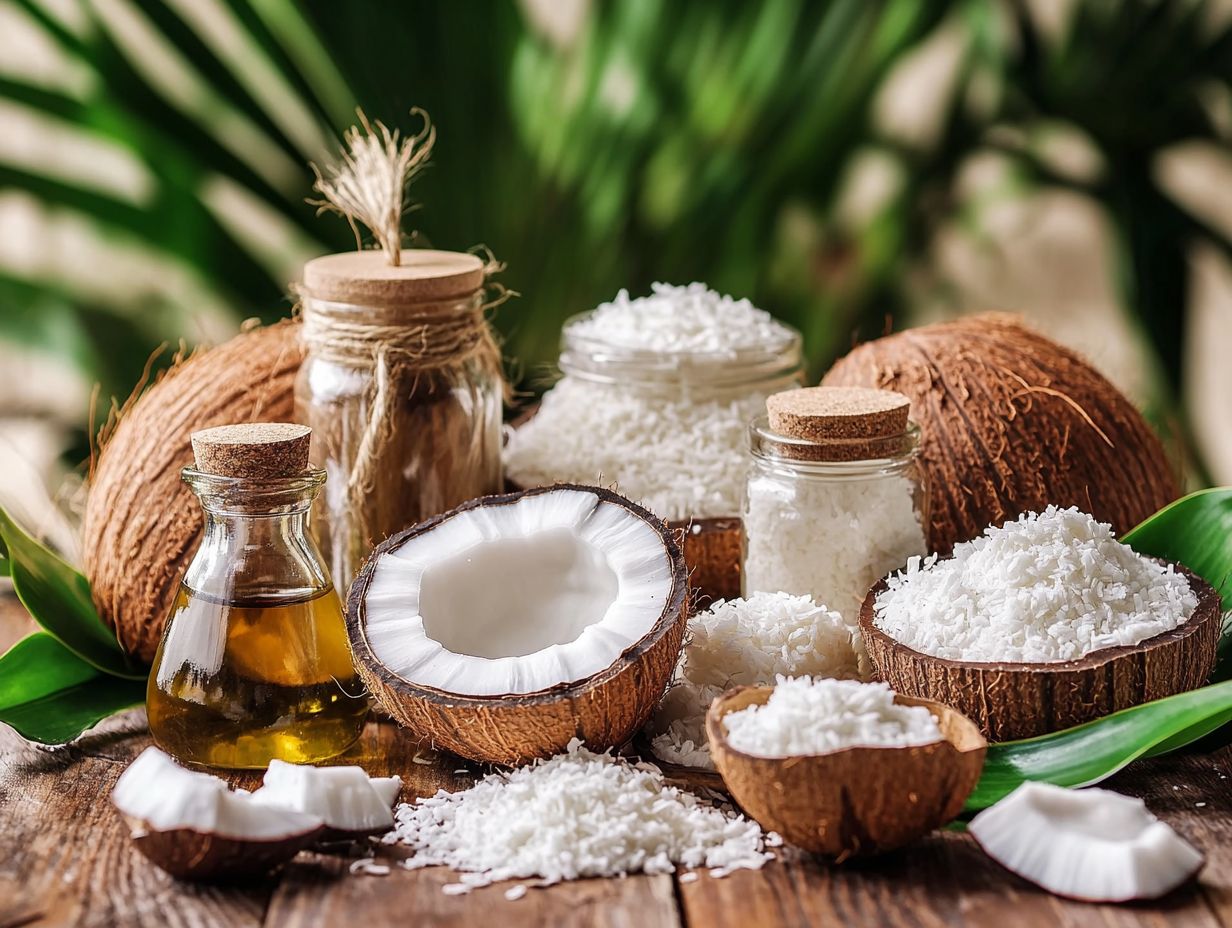
Coconut milk is undeniably a delicious and nutritious choice for anyone embracing a ketogenic diet. However, indulging in it excessively can lead to certain risks, particularly concerning its calorie content. High caloric intake from coconut milk can impede your weight loss journey, highlighting the importance of enjoying it in moderation!
If you have sensitivities to dairy-like products, consuming large amounts of coconut milk might cause discomfort, underscoring the need for mindful consumption.
As you navigate a low-carb lifestyle, recognize that while coconut milk serves as a popular source of healthy fats, it can easily lead to an excess of calories if not measured with care. This could disrupt your macro balance, a crucial aspect of maintaining ketosis.
If you have a history of gastrointestinal issues, be cautious rich coconut products may prove challenging, as their high-fat content could worsen sensitivities. Including medium-chain triglycerides (MCTs) in your diet can help balance your fat intake without overloading on calories.
Like any other ingredient, coconut milk should ideally complement a well-rounded diet that emphasizes variety and balance, paving the way for optimal health outcomes.
Act now to avoid potential health issues and ensure you enjoy the benefits of coconut products while maintaining moderation!
Risks of Coconut Water on Keto
Coconut water is celebrated for its hydrating properties and low-calorie content. However, drinking too much of this refreshing beverage can come with some caveats, especially regarding its natural sugar content. If you’re following a strict keto diet, the sugar in coconut water while natural can quickly push you over your desired carbohydrate limits if consumed in large quantities. Balance your coconut water intake with other hydration options to ensure it aligns with your overall dietary goals. Unsweetened coconut water is a better option in this regard.
When you’re on a low-carb eating plan, overindulging in coconut water might lead to unwanted spikes in blood sugar levels, potentially disrupting your state of ketosis. Remember, coconut water can affect your blood sugar! While it provides essential electrolytes like potassium and magnesium, the sugar content can accumulate and veer you away from optimal carbohydrate consumption. Be mindful of your intake and consider alternative hydration sources like plain water and herbal teas to support your ketogenic goals.
Given these factors, don’t miss out on alternatives like plain water or herbal teas. These options can offer the hydration you need without the carbohydrate concerns tied to sweeter drinks.
Incorporating a variety of coconut products such as coconut flakes, coconut granola, unsweetened coconut milk, and coconut chips into your keto recipes can enhance both the flavor and nutritional profile of your meals.
Common Questions About Coconut Products on Keto
What are the top coconut products that are suitable for a keto diet?
Some of the top coconut products suitable for a keto diet include coconut oil, coconut flour, coconut milk, coconut butter, and unsweetened shredded coconut.
Can coconut products help with weight loss on a keto diet?
Yes, coconut products can assist with weight loss on a keto diet. Coconut oil, for example, contains medium-chain triglycerides (MCTs) a type of fat that can be quickly used for energy which have been shown to increase metabolism and aid in weight loss. Unsweetened coconut milk and high-fiber coconut flour can also support your weight loss goals when used mindfully.
Are all coconut products keto-friendly?
No, not all coconut products are keto-friendly. It’s important to check the ingredients and nutritional information to ensure the product is low in carbs and does not contain added sugars. Opt for unsweetened versions to stay within your carb limits.
How can I incorporate coconut products into my keto diet?
There are various ways to incorporate coconut products into a keto diet. You can use coconut oil for cooking and baking, coconut flour for low-carb desserts and bread, coconut milk for smoothies or as a dairy-free alternative in recipes, and coconut flakes or desiccated coconut as toppings in various dishes.
Are coconut products a good source of fat on a keto diet?
Yes, coconut products are an excellent source of healthy fats on a keto diet. They are high in medium-chain triglycerides (MCTs), which can be rapidly converted into ketones by the liver for energy. Incorporating coconut chips and unsweetened coconut milk can further enhance your fat intake while keeping it healthy.
Can I use coconut products as a substitute for dairy on a keto diet?
Yes, coconut products can be used as substitutes for dairy on a keto diet. Coconut milk, for example, can replace regular milk in recipes, and coconut butter can serve as a spread instead of regular butter. Unsweetened versions are preferable to keep your carb intake low.

